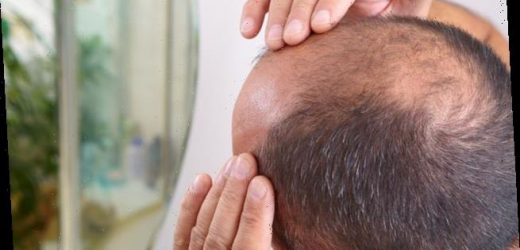Why stress can make you lose your hair: Scientists discover how tension suppresses the activity of hair follicles in breakthrough that could pave the way for a treatment for baldness
- Researchers studied the role of the stress hormone corticosterone on hair
- Tests on mice found it inhibits the production of the chemical GAS6
- This causes hair follicles to stay dormant for longer and can lead to hair loss
Stress may lead to hair loss and balding, a new study on mice suggests.
Researchers from Harvard University found corticosterone, a hormone in mice released during stress, suppresses the production of a protein called GAS6.
GAS6 promotes the growth of hair follicles and when a person or animal is stressed, high corticosterone levels prevent it being made.
The discovery has not yet been shown to apply to humans but researchers say the mechanism is believed to be similar.
Experts hope that by understanding the underlying cause of hair loss they can produce therapeutics, such as creams, that can prevent stress-induced balding.
Scroll down for video
Being stressed may lead to baldness as the body makes chemicals which inhibit growth in hair follicles, a study on mice has found
WHAT ARE THE CAUSES OF HAIR LOSS?
It is perfectly normal for people to lose small amounts of hair as it replenishes itself and, on average, people can shed between 50 and 100 hairs per day.
However, if people start to lose entire patches of hair or large amounts of it it can be more distressing and potentially a sign of something serious.
Pattern baldness is a common cause of hair loss as people grow older. At least half of men over the age of 50 will lose some of their hair just through the ageing process, according to the British Association of Dermatologists.
Women may lose their hair as they grow older, too.
Other, more concerning causes of hair loss include stress, cancer treatment such as chemotherapy or radiotherapy, weight loss or an iron deficiency.
Most hair loss is temporary, however, and can be expected to grow back.
Specific medical conditions which cause the hair to fall out include alopecia, a disorder of the immune system; an underactive or overactive thyroid; the skin condition lichen planus or Hodgkin’s lymphoma, a type of cancer.
People should visit their doctor if their hair starts to fall out in lumps, falls out suddenly, if their scalp itches or burns, and if hair loss is causing them severe stress.
Study author Ya-Chieh Hsu, professor of stem cell and regenerative biology at Harvard University, said: ‘Stress hormones suppress growth in mice through the regulation of hair follicle stem cells.’
Throughout a person’s lifespan, hair follicles go through three stages: ‘anagen’, the growth phase; ‘catagen’, the degeneration phase; and ‘telogen’, a rest period.
During anagen, a follicle continuously pushes out a hair shaft. In catagen, growth stops and the lower part shrinks, but the hair remains in place.
In the telogen phase however, the hair follicle stem cell is not active and, as a result, the hair can soon fall out.
The US-based team studied the role of the stress hormone on mice by removing their adrenal glands which pump out the chemical.
The altered mice were unable to make corticosterone, mimicking what it is like in a no-stress environment.
Data shows the hair follicles of these mice were in telogen for just 20 days, three times less than in the non-altered mice which do make corticosterone.
The follicles also engaged in hair growth three times as often, the researchers say.
Researchers then injected the mice with GAS6 and found it successfully reinitiated hair growth.
‘Restoring the expression of GAS6 could overcome stress-induced inhibition of hair follicle stem cells – and might encourage regeneration of growth,’ Professor Hsu explains.
Prof Rui Yi, a dermatologist at Northwestern University in Chicago who was not involved in the study, said: ‘These exciting findings establish a foundation for exploring treatments for hair loss caused by chronic stress.
‘The authors might have uncovered a previously unknown mechanism that stimulates Hair-follicle stem cell (HFSC) activation directly by promoting cell division.’
‘Modern life for humans is inevitably stressful. But perhaps, one day, it will prove possible to combat the negative impact of chronic stress on our hair, at least – by adding some GAS6.’
Currently, transplanting hair follicles from one part of the head to the other is the only option for male-pattern baldness.
The study was published in the journal Nature.
Scientists claim to have found an extract from mangrove trees that can cure BALDNESS
Thai researchers claim to have found an extract from mangrove trees that can cure baldness.
A small study of 50 people suffering with androgenic alopecia — the most common form of baldness — indicates that the extract halts hair loss and also promotes hair growth.
The substance, called Avicennia Marin, contains the key chemical Avicequinon-C.
This active compound is thought to reverse hair loss by interfering with enzymes which lead to elevated hormone levels that cause baldness.
Researchers hope the findings could help people suffering from androgenetic alopecia to reverse their hair loss.
Source: Read Full Article



